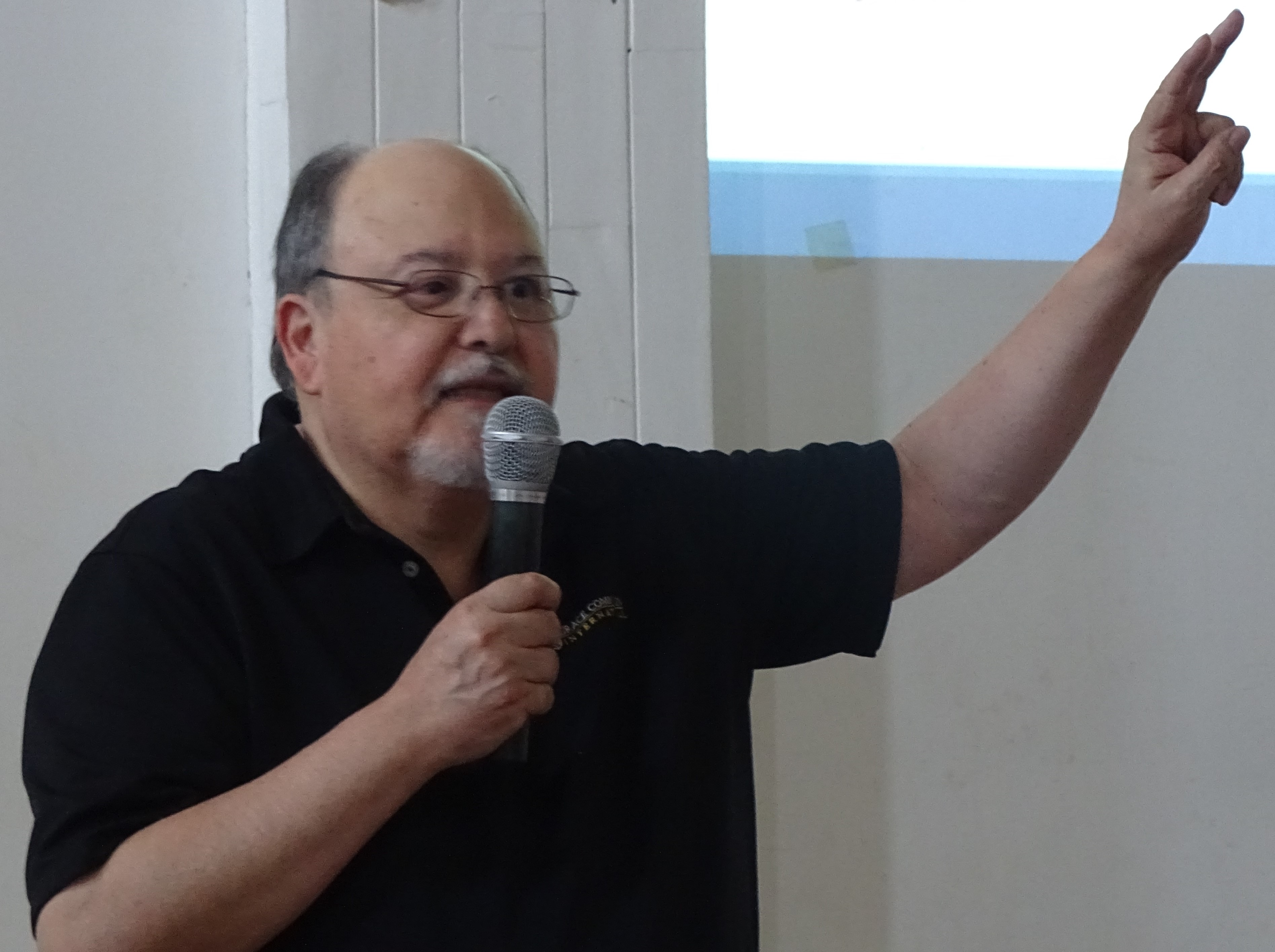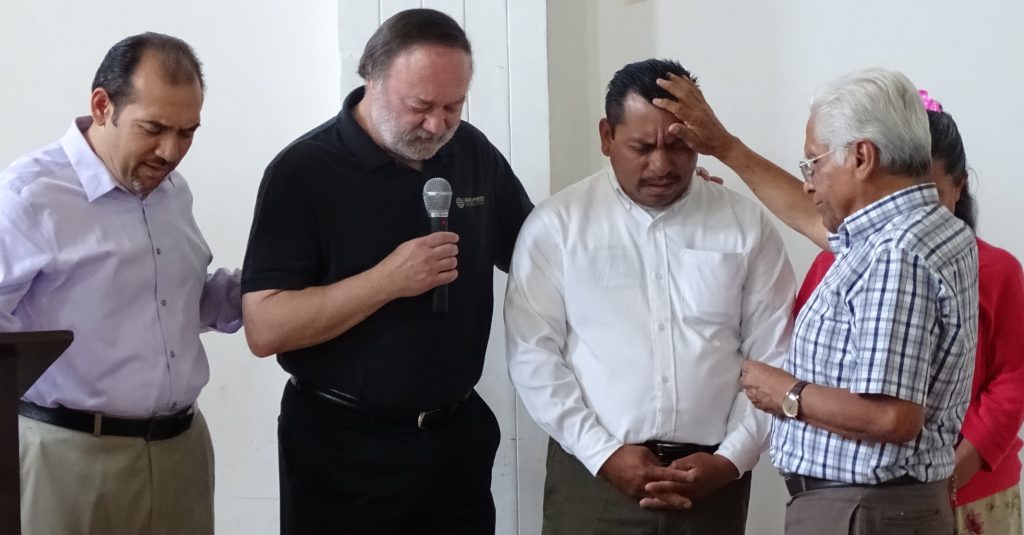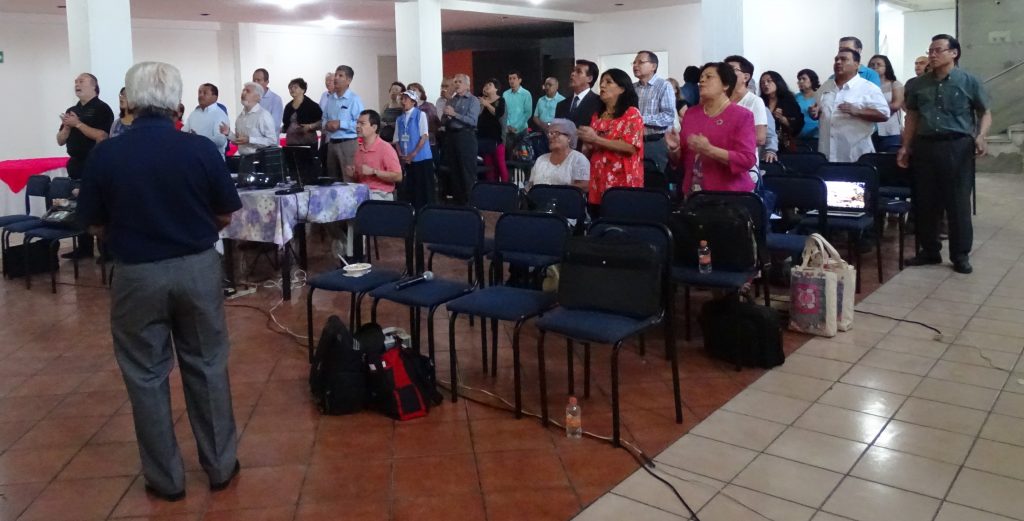GCI-Italy is hosting a worship festival in Montegrotto Terme, Italy on August 24-27. Members and friends around the world are invited! For information, click here.
Author: GCI Media
Is the law binding on Christians?
Dear Brothers and Sisters,

As Tammy and I waited in an airport lobby near the gate where we would soon board our plane to fly home, I noticed a young man two seats away glancing at me repeatedly. After several minutes he asked, “Are you Joseph Tkach?” He seemed delighted to start a conversation, noting that he had recently been disfellowshipped from one of the Sabbatarian groups. Our conversation soon turned to the law of God—he was quite interested in my comment that Christians understand that though God gave Israel the law, they were incapable of obeying it perfectly. We agreed that Israel truly did have a “colorful” history, often separating itself from God’s law. We also agreed that this was no surprise to God, for he knows the beginning from the end.

(public domain via Wikimedia Commons)
I then mentioned to him that the law given to Israel through Moses had 613 commands. He agreed that there are numerous arguments concerning how many of these laws are binding on Christians. Some argue all are to be kept because all are “from God.” But if that were true, Christians should be sacrificing animals and wearing phylacteries. He agreed there are all sorts of opinions concerning which of these 613 commands have a spiritual application today and which do not. We agreed that the various Sabbatarian groups are divided on this issue—some practicing physical circumcision; some the land Sabbaths and Israel’s festivals; some a first tithe but not a second or third, and some three; some keeping the Sabbath but not the annual festivals; some observing new moons and sacred names—each believing their “package” of doctrines is biblically correct and the others are not. He noted he had been wrestling personally with this issue for some time and had discontinued the way he had been observing the Sabbath, though he still worried that he might not be keeping it correctly.
Surprisingly, he agreed that many Sabbatarians err in not recognizing that the coming of God in the flesh (in the person of Jesus) established what Scripture refers to as the “new covenant” (Hebrews 8:6), making the law as it was given to Israel obsolete (Hebrews 8:13). Those who do not acknowledge this basic truth, and so seek to live by the terms of the law of Moses (added 430 after God established the covenant with Abraham, see Gal. 3:17) are not practicing the historic Christian faith. I think a breakthrough in our discussion came for him when he understood to be false the idea (held by many Sabbatarians) that we are now “between the old and new covenants” (with the new covenant not coming until Jesus returns). He also agreed with me that Jesus was the real sacrifice for sin (Hebrews 10:1-3) and though peace offerings and fellowship sacrifices are not specifically said to be done away in the New Testament, we know Jesus fulfilled them as well. As Jesus declared, the Scriptures do testify of him, and he fulfills the law.

The young man told me he still has questions about keeping the Sabbath. I told him the Sabbatarian perspective fails to understand that the application of the law has been transformed by Jesus’ first coming. Though still valid, the law of God now applies in a spiritual way—one that takes full account of Christ’s fulfillment of the law as it was given to Israel; one that relies on our deepened relationship with God through Christ and by the Spirit, which reaches down into our very nature—into our hearts and minds. By the Spirit, we now live out our obedience to God as members of the Body of Christ. For example, if our hearts are circumcised by the Spirit of Christ, it does not matter whether or not we have been circumcised in the flesh.
Christ’s fulfillment of the law means our obedience to God flows out from that deeper and more intensive work of God accomplished by Christ and the coming of his Spirit. As Christians, our obedience flows from what always was behind the law, namely the heart, mind and ultimate purposes of God. We see this in Jesus’ new command: “Love one another. As I have loved you, so you must love one another” (John 13:34). Jesus both spoke and lived this command, knowing that, in and through his earthly ministry, God would, by the power of the Spirit, write the law upon our hearts, thus fulfilling the prophecies of Joel, Jeremiah and Ezekiel.
By bringing a new covenant that fulfills and completes the task of the old, Christ transformed our relationship to the law and renewed the form that our obedience takes as his people. The same underlying law of love exists, but Jesus personified that law and fulfilled it. The old covenant with Israel and the law enclosed within it (including sacrifices, tassels and Jubilee years) had, for the nation of Israel, specific, particular applications of the underlying law of love. But those specifics are, in many cases, now obsolete. The spirit of the law remains, but the letter of the written law specifying the particular form of obedience does not necessarily hold.
The law could not fulfill itself; it could not change hearts; it could not prevent its own misuse; it could not guard against temptation; it could not specify the particular forms of obedience for each and every family on earth. Since the completion of Jesus’ earthy ministry and his sending of the Holy Spirit, there are now other ways by which we express our devotion to God and our love for our neighbors. Those who have received the Spirit can now better hear the Word of God and understand God’s purposes for their obedience because that obedience was embodied and revealed in Christ, passed on to us by his apostles, and preserved for us in the books we call the New Testament. Jesus, our great High Priest, shows us the heart of the Father and sends us the Spirit. By the Holy Spirit, we can now respond to the Word of God out of the depths of our heart, bearing witness in word and deed to God’s purposes to extend his blessing to all families of the earth. This far exceeds what the law could do, for it is far beyond what God intended the law to accomplish.
The young man agreed with these points, then asked how this understanding applies to the Sabbath. I noted that the Sabbath had several purposes for the people of Israel: it reminded them of creation; it reminded them of their exodus from Egypt; it reminded them of their special relationship with God; and it provided physical rest for animals, servants and families. Morally, the Sabbath reminded Israel of their duty to cease from evil works. Christologically, it pointed them to the need for spiritual rest and completion in the coming Messiah—trusting in him rather than in their own works for salvation. The Sabbath also symbolized the completion of creation at the end of the age.
I shared that most Sabbatarians seem unable to see that the regulations of the law, given to Israel through Moses, were temporary—restricted to a particular time and place in the history of the nation of Israel. I noted that it is not hard to see that “not cutting the corner of your beard” or “make tassels on the four corners of the cloak you wear” are not relevant for all times and places. When God’s purposes for Israel as a nation were fulfilled in Jesus, God, through his Word and Spirit reached out to all people. As a result, the form of obedience to God changed to fit the new situation.
When it comes to the seventh-day Sabbath, authentic Christianity does not turn the seventh day of the week into a form of astrology as if God had made one day of the week superior to the others. Instead of setting a single day aside to acknowledge God’s holiness, God now resides in us by his Spirit, thereby making all our time holy. Though we could meet together on any day of the week to celebrate God’s presence with us, most Christian churches meet for worship on Sunday, the day most widely-regarded as the day on which Jesus rose from the dead, thus fulfilling the old covenant promises. Jesus magnified the Sabbath law (and all aspects of the Torah) far beyond the temporal limits of what the written letter of the law could do. He even elevated the law of “love your neighbor as you love yourself” to “love one another as I have loved you.” This is a staggering quality of love that cannot be captured in 613 commands (or even in 6,000 commands!). God’s faithful fulfillment of the law makes Jesus, not a written code, our center point. We don’t focus on a day of the week, we focus on him. We live each day in him, because he is our rest.
Before we boarded our respective flights, we agreed that the spiritual application of the Sabbath law is about living a life of faith in Christ—a life that, by the grace of God, through the new and deeper work of the Holy Spirit within us, changes us from the inside-out.
Forever grateful for God’s grace that heals us from head to toe,
Joseph Tkach
PS: I asked Gary Deddo to write an essay that elaborates on what I’ve shared here and also in my letter on the covenants in the March 22 issue of Weekly Update. You’ll find his essay in this issue (click here)—it’s long, I know, but the topic deserves a comprehensive review. I encourage you to read his essay carefully.
“We Are GCI,” leadership equipping

Effective leaders are good communicators. To grow in that vital competency, it’s important to understand one’s own leadership voice and the voices of others on the leadership team. To help us do that, the upcoming GCI Denominational Conference in Orlando will have plenary and breakout sessions with Dr. Tom Nebel of GiANT Worldwide. To learn more about what he will teach, click here. For additional information about the conference and to get registered, click here.

Tom has served as a church planter, pastor and Director of Multiplication for Converge Worldwide, where he helped start over 800 new churches across the globe. For the last three years, he has served as a Senior Associate with GiANT Worldwide, a leadership consultancy that “builds leaders worth following who lead organizations everyone wants to work for.” GiANT believes the best leaders are secure, humble, and confident: David not Goliath. Tom is recognized as an engaging biblical communicator and effective coach of those seeking to increase their personal, team and organizational capacities. He specializes in recognizing and removing the obstacles standing in the way of success.
GiANT’s leadership tools are highlighted in two GCI Equipper articles:

Conference in Mexico
This update is from Heber Ticas, ecclesiastical supervisor of GCI’s congregations in Mexico.
Over the Easter weekend (April 14–16), GCI Mexico held its annual conference for pastors and other congregational leaders in Guadalajara, Mexico. It was a great time of fellowship, worship, renewal and learning. Dr. Joseph Tkach was the keynote speaker and those in attendance were inspired as he shared the good things the Lord is doing in our fellowship around the world.
Throughout the weekend, various teaching sessions were offered. Lorenzo Arroyo gave a workshop on the different models of the doctrine of salvation, emphasizing GCI’s incarnational Trinitarian theology. Heber Ticas gave a series of workshops challenging pastors and others to lead their congregations through four avenues (phases) leading to becoming a fully missional church: 1) developing a missionary mentality, 2) missional development, 3) experiencing missional movement, and 4) being a church fully engaged in missional rhythms. Xochilt Ticas (Heber’s wife) gave a workshop for women on forgiveness, including the important role of forgiveness in the life of a congregation.


The highlight of the conference was Dr. Tkach’s Easter Sunday sermon on the resurrection, and the ordination of Jose Luis Seba who started a small group in Tlaxcala Mexico a few years back that has blossomed into a full church.

Overall, the conference was a great encouragement to GCI’s congregations in Mexico. Please pray for them, asking God to bless the work he is doing in and through them in the nation of Mexico.
We send heartfelt thanks to our brothers and sisters in Canada and the United States for the financial assistance that made this conference possible.
Baptisms at Hands for Christ
We are pleased to announce that Hands for Christ (GCI’s congregation for the deaf in Staten Island, NY) baptized seven people on April 15. Lead Pastor Mary Bachelor reports that “it was a glorious event—all seven were filled with joy and graciousness.” Five of the newly baptized are deaf and two are hearing. As Mary noted, “All were thankful to have the opportunity to proclaim their commitment, faith, love and relationship with Jesus Christ. It was an honor to baptize these people into the name of the Father, the Son and the Holy Spirit.” Here are pictures of the blessed event:

Ingrid Mandel
Thanks for praying for Ingrid Mandel (click here for the previous prayer request) Her husband, retired GCI pastor Willi Mandel, notified us that Ingrid was able to get the hip surgery that she badly needed. The doctor was able to fit her in before he left on vacation.
Ingrid and Willi are thankful for all the prayers that were requested and answered on their behalf. Please now pray for Ingrid’s successful and rapid recovery.
Cards may be sent to:
Ingrid Mandel
747 Tanner Drive
Kingston, ON K7M 9G7
CANADA
Andrew Silcox
Please pray for retired GCI pastor, Andrew Silcox who is in a hospital in France near where he and his wife Dana live. Andrew is being treated in the Intensive Care Unit for severe blood poisoning. Due to his Type II Diabetes, and a recent surgery for a triple fracture on his foot, Andrew is in a dangerous condition. He is not conscious at present, being held on dialysis and monitoring so further surgery can take place if required. He is in the hands of one of the best surgeons in Europe who did the original surgery. The family would be deeply thankful for four things:
- Prayers for the medical team’s managing all aspects of the threat to his well-being. They have an enormous task and everything they learn from this will help the next person.
- Prayers for the family that is spread around the world.
- Prayers that, if at all possible, both the foot injury and the blood poisoning and their resultant effects to his vital organs will have the healing touch of the Masters hands.
- Privacy, with the very strong qualification that Dana is able to play sound messages to Andrew in the ICU. Though he is not conscious, it is evident that these message help him fight on mentally. Voice messages can be emailed to bensilcox@gmail.com.
Worshipping God with music
Dear Brothers and Sisters,

According to Holiday Insights, this week is National Karaoke Week. Perhaps you’ve heard someone singing karaoke and reflexively flinched at their off-key notes. Nietzsche had it right when he wrote, “We listen to music with our muscles.” Our unconscious bodily responses to music include tapping our feet or swaying to the rhythm. I found myself doing both during the singing at the Easter-weekend conference of our Mexican churches in Guadalajara, Mexico. Because we were singing in Spanish, the music was particularly stirring for me. I was also moved by the wonderful Mariachi worship band with its two trumpets, five violins and four guitars of various sizes. One song began with a trumpet blast so rousing we all felt like marching forward!
Neurologist Oliver Sacks had it right when he wrote, “Listening to music is not just auditory, it is motoric as well.” According to neurological studies, music has the ability to activate entire regions and networks within the brain. This is one reason music is used in several rehabilitative therapies. As the old saying goes, “Music has charms to soothe a savage breast, to soften rocks, or bend a knotted oak.”
It’s important to think about the impact that music has in our worship of God. We don’t sing in church to just fill the time, or as a mere warm-up to the sermon. Worship music (instrumental and vocal) has played a significant role in the worship of the church down through the centuries. Music has been, is, and for eternity will be a principal way the people of God worship their Lord and Savior.
After escaping Egypt by crossing the Red Sea, the Israelites sang to the Lord (Exodus 15:1-21). Music was a central part of Israel’s worship in the tabernacle and the temple (1 Chronicles 6:31-32, 16:42). The Psalms preserve lyrics to some of that music—some joyful, some sorrowful (blues is not only a modern musical genre!). Jesus and his disciples sang hymns (Matthew 26:30) and the book of Revelation tells of a day when “every creature in heaven and on earth and under the earth and on the sea, and all that is in them” will sing praises to the Lamb of God seated on his throne (Revelation 5:13). As Karl Barth noted, singing is an essential ministry of the church:
The Christian church sings. It is not a choral society. Its singing is not a concert. But from inner, material necessity it sings. Singing is the highest form of human expression…. What we can and must say quite confidently is that the church which does not sing is not the church. And where… it does not really sing but sighs and mumbles spasmodically, shamefacedly and with an ill grace, it can be at best only a troubled community which is not sure of its cause and of whose ministry and witness there can be no great expectation…. The praise of God which finds its concrete culmination in the singing of the community is one of the indispensable forms of the ministry of the church. (Church Dogmatics, IV.3, 16.72)
When we play instrumental music or sing in church, our audience is first the Lord (Psalm 96:1) then, secondarily, one another. Our singing seems best when it is expressive of a sense of awe and wonder at the presence of God. By directing our attention beyond the music itself to the One whom we worship, music leads our thoughts toward God rather than toward ourselves. John Calvin commented about the energy we obtain from music in worship when he wrote this:
[Music] lends dignity and grace to sacred actions and has the greatest value in kindling our heart to a true zeal and eagerness to pray. (Calvin, Institutes, III. 20, #32)
There is something very special that we feel when our hymns and choruses correlate with the biblical texts being verbalized in the Scripture reading and expounded in the sermon. It is as if our hearts are lifted, and we soar like eagles. That’s how I felt in Guadalajara over Easter, and it’s how I feel when I join the people of God in various places around the world as we lift our voices in song to worship the triune God, Father, Son and Spirit.
Holiday Insights also says that April 26 is Hug an Australian Day. So in the spirit of that holiday, I extend to all our Aussie members (and to all our members everywhere) this ancient priestly blessing:
The Lord bless you and keep you; the Lord make his face shine on you and be gracious to you; the Lord turn his face toward you and give you peace. (Numbers 6:24-26)
Joseph Tkach
PS: Warm greetings to you all from our members in Mexico! For more about the conference, click here.
Sometimes you have to kill cockroaches
The principles that apply in large churches sometimes don’t in small ones. This issue is helpfully addressed in an article by Karl Vaters titled “Only In a Small Church: Sometimes You Gotta Kill Cockroaches.” To read it, click here.
New Home Office purchased
God has answered our prayers! On April 20, we finalized purchase of the office building shown below. Sometime next year, we’ll move GCI’s denominational Home Office from Glendora, CA, to this building located in the Charlotte, NC, area. Thanks for your prayers concerning the search and purchase process. Please now pray about the logistics involved in the move.

Concerning the purchase process, GCI Treasurer Mat Morgan shared this:
It just felt blessed! I felt the Holy Spirit’s guiding hand from start to finish. The closing process took only 30 days—a speed seldom accomplished in commercial real estate. The seller went above and beyond in assisting us. He stayed with our team late into the night to help us both understand and then transfer building systems and contracts. God’s hand was in it all—I think he wanted us to connect with the previous owner, and so we have.








